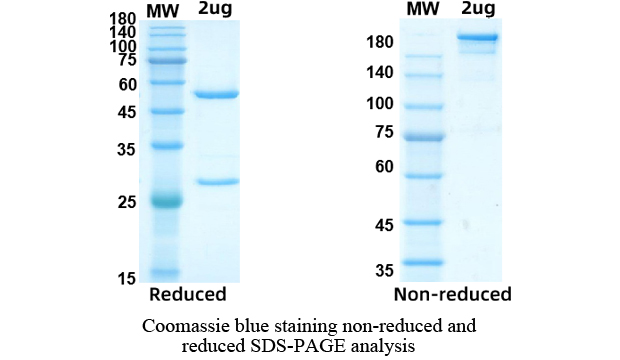
浏览量: 278
- 产品名称: Research Grade Cilgavimab(AZD1061)
- 产品货号: CSD00704
- 货期: 现货
- 价格与订购: 2480
- 数量:
库存: 100
- 规格: 100μg
- 产品信息
- 如何订购
货号(Catalog No.)
CSD00704
通用名INN
Cilgavimab
纯度(Purity)
>95%
电泳图(SDS-PAGE image)
浓度( Concentration)
1mg/ml
Formulation
PBS buffer PH7.5
Source
XtenCHO
内毒素(Endotoxin level)
Please contact with the lab for this information.
生物活性
靶点;物种(Specificity target name;species)
RBD[SARS-CoV-2]
靶点背景信息(Target information)
Protein S (PROS1) is glycoprotein and expressed in many cell types supporting its reported involvement in multiple biological processes that include coagulation, apoptosis, cancer development and progression, and the innate immune response. Known receptors bind S1 are ACE2, angiotensin-converting enzyme 2, DPP4, CEACAM etc.. The spike (S) glycoprotein of coronaviruses is known to be essential in the binding of the virus to the host cell at the advent of the infection process. Most notable is severe acute respiratory syndrome (SARS). The severe acute respiratory syndrome-coronavirus (SARS-CoV) spike (S) glycoprotein alone can mediate the membrane fusion required for virus entry and cell fusion. It is also a major immunogen and a target for entry inhibitors. It's been reported that 2019-nCoV can infect the human respiratory epithelial cells through interaction with the human ACE2 receptor. The spike protein is a large type I transmembrane protein containing two subunits, S1 and S2. S1 mainly contains a receptor binding domain (RBD), which is responsible for recognizing the cell surface receptor. S2 contains basic elements needed for the membrane fusion.The S protein plays key parts in the induction of neutralizing-antibody and T-cell responses, as well as protective immunity.
种类(Species)
Humanized
受体鉴定(Receptor identification)
Human IgG
化学信息
分子量(MV)
150000.00 Da
存储条件(Storage)
Use a manual defrost freezer and avoid repeated freeze-thaw cycles.
Store at +4°C short term (1-2 weeks).
Store at -20 °C 12 months.
Store at -80°C long term.
Store at +4°C short term (1-2 weeks).
Store at -20 °C 12 months.
Store at -80°C long term.
Note
For research use only .


 地 址:
地 址: 产品销售:
产品销售: E - mail :
E - mail : 邮 编:
邮 编:
 Amily
Amily


